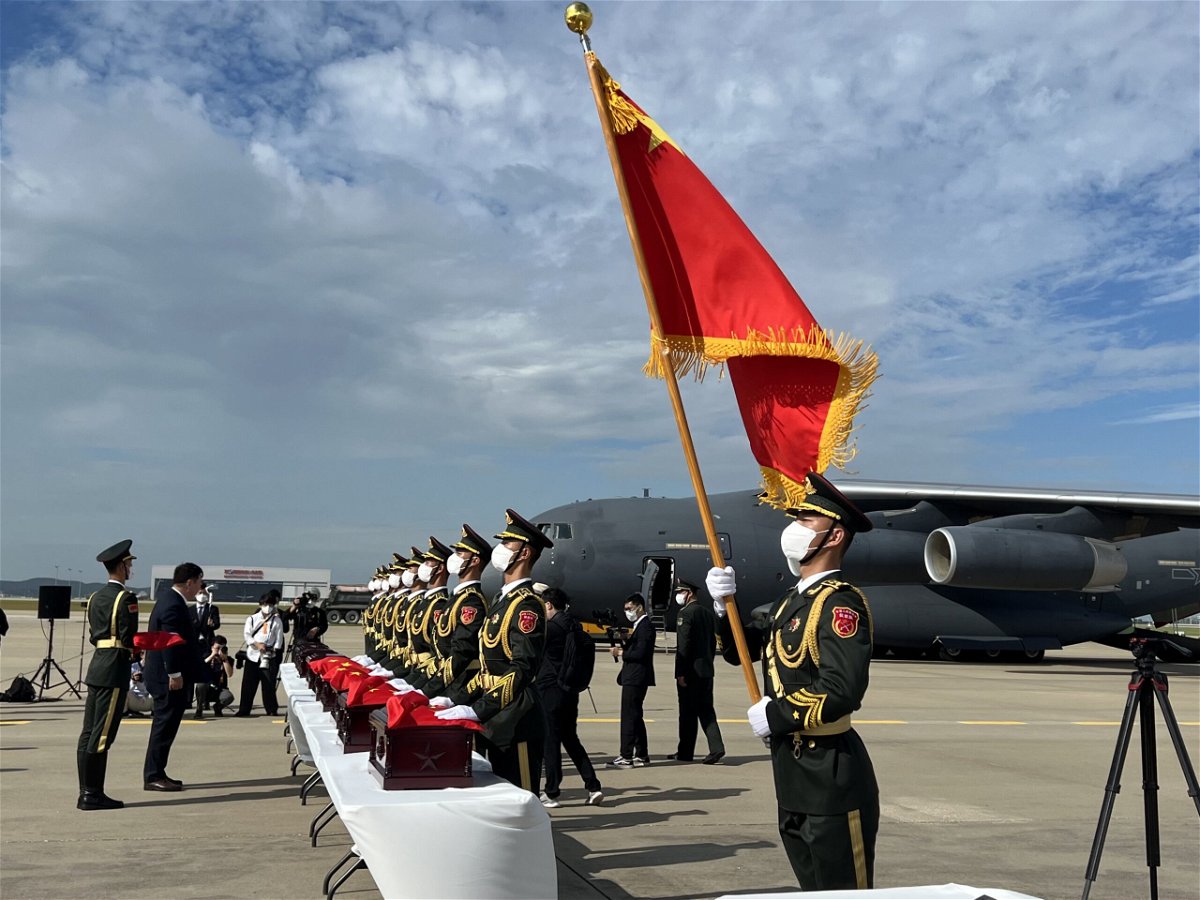70 years later, China and South Korea exchange the remains of Korean war dead

South Korea hands over the remains of Chinese who fought in the Korean war on September 16.
By Gawon Bae, CNN
The Chinese and South Korean soldiers stood face to face, the wind whipping through their ranks and their national flags flapping in the gusts. A Chinese military transport jet nearby on the runway of Incheon International Airport opened its rear door to receive precious cargo.
Nine South Korean soldiers then moved towards their Chinese counterparts in precise steps before carefully handing over nine ornate wooden boxes, which were then set on a table and covered with nine red Chinese flags by Beijing’s ambassador to Seoul Xing Haiming.
Inside each box were the remains of a Chinese soldier who died some 70 years ago, during the Korean War, when the armies of these two countries fought over the land these soldiers were standing on now.
“Repatriating the remains of the volunteer patriotic martyrs by both sides (is) an important symbol of the new development of China-Korean relations, and furthermore, it is significant in developing mature and healthy bilateral relations,” said Chinese Vice Minister of Veterans Affairs Chang Zhengguo during Friday’s handover.
South Korean Vice Foreign Minister Lee Do-hoon said the repatriation is a “symbol of friendly cooperation.”
In the fall of 1950, Beijing sent a quarter-of-a-million troops into the Korean Peninsula, supporting its North Korean ally and pushing back the combined forces of South Korea, the United States and other countries under the United Nations Command.
Those forces had almost reached the Yalu River, which separates China from North Korea, when then leader Mao Zedong dispatched the Chinese People’s Volunteers to intervene.
The Chinese pushed that combined allied army back down the peninsula, eventually resulting in a stalemate along the 38th parallel, the demilitarized zone that divides North and South Korea to this day.
More than 180,000 of those Chinese troops died in the Korean War, or what Beijing calls the War to Resist US Aggression and Aid Korea. Eighty-eight of them began their journey back to their homeland on Friday.
Since 2014, South Korea has been repatriating the remains of Chinese soldiers recovered in South Korea, according to the “international law and spirit of humanity,” the South Korean Defense Ministry said.
Before Friday, a total of 825 remains of Chinese soldiers had been repatriated between 2014 and 2021.
After the ambassador placed the Chinese flag over the ninth casket on Friday, all Chinese officials stood up and bowed three times to pay respect to their ancestors.
The Chinese guards, in return, saluted.
They then marched neatly into the parked warplane, where the other 79 sets of remains were waiting to return finally to their home.
Once all the caskets — some of which also contained personal artifacts such as watches, stamps, shoes and faded photographs — were aboard, the Y-20 closed its cargo bay, turned its four engines on and took off.
On Saturday, the Chinese remains will be buried in the Chinese People’s Volunteers’ martyrs’ cemetery in Shenyang, the capital of northeast China’s Liaoning province, following another ceremony, state-owned tabloid the Global Times reported.
Escorting the soldiers’ remains and the Y-20 will be one of the Chinese military’s newest, proudest accomplishments: J-20 stealth fighters.
“This will be the first time the powerful J-20 stealth fighter jet has been deployed since the PLA Air Force started such missions in 2015,” said the Global Times.
Previous repatriations had relied on J-11s and the use of the more modern aircraft shows the “growing strength of the PLA,” the report said.
And it shows just how far the Chinese military has come in 70 years.
The-CNN-Wire
™ & © 2022 Cable News Network, Inc., a Warner Bros. Discovery Company. All rights reserved.
CNN’s Brad Lendon contributed to this report.
